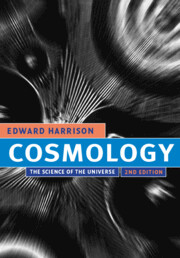Book contents
- Frontmatter
- Contents
- Preface
- Introduction
- PART I
- 1 What is cosmology?
- 2 Early scientific cosmology
- 3 Cartesian and Newtonian world systems
- 4 Cosmology after Newton and before Einstein
- 5 Stars
- 6 Galaxies
- 7 Location and the cosmic center
- 8 Containment and the cosmic edge
- 9 Space and time
- PART II
- PART III
- Appendix – Fundamental quantities
- Index
3 - Cartesian and Newtonian world systems
from PART I
Published online by Cambridge University Press: 05 June 2012
- Frontmatter
- Contents
- Preface
- Introduction
- PART I
- 1 What is cosmology?
- 2 Early scientific cosmology
- 3 Cartesian and Newtonian world systems
- 4 Cosmology after Newton and before Einstein
- 5 Stars
- 6 Galaxies
- 7 Location and the cosmic center
- 8 Containment and the cosmic edge
- 9 Space and time
- PART II
- PART III
- Appendix – Fundamental quantities
- Index
Summary
Awake! for Morning in the Bowl of Night
Has flung the Stone that puts the Stars to Flight.
Edward FitzGerald (1809–1883), The Rubáiyát of Omar KhayyámTHE DECLINE OF ARISTOTELIAN SCIENCE
Aristotle's law of motion
In Aristotle's day, ideas on space and time were vague and had yet to be sharpened into their modern forms. Space was associated with the distribution of things directly observed. Things distributed in time, however, were not directly observed, and generally intervals of time were not easily measured. How to define motion by combining intervals of space and time was not at all clear, and motion was poorly distinguished from other forms of change.
Aristotle's law of motion may be expressed by the relation
applied force = resistance × speed.
But really he had no general formula, and no precise way of measuring force, resistance, and speed. He argued qualitatively, reasoning from the everyday experience that effort is needed to maintain a state of motion, and the faster the motion, the bigger the effort needed to maintain that motion. “A body will move through a given medium in a given time, and through the same distance in a thinner medium in a shorter time,” said Aristotle, and “will move through air faster than through water by so much as air is thinner and less corporeal than water.” Guided by this principle, it seemed natural to conclude that bodies of unequal weight fall through air at different speeds.
Information
- Type
- Chapter
- Information
- CosmologyThe Science of the Universe, pp. 49 - 65Publisher: Cambridge University PressPrint publication year: 2000
